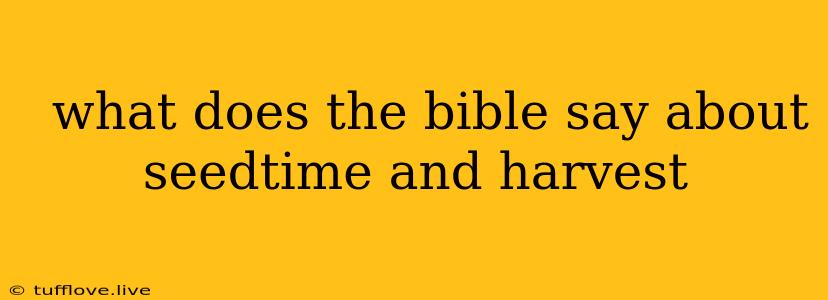The concept of "seedtime and harvest" is deeply rooted in biblical teachings, offering profound insights into the principles governing our lives, particularly in relation to our actions and their consequences. It transcends mere agricultural metaphors to encompass spiritual, moral, and even societal implications. This essay will explore what the Bible says about seedtime and harvest, delving into the various contexts and applications of this central theme.
The Literal and Figurative Meaning of Seedtime and Harvest
At its most basic level, the concept of seedtime and harvest refers to the agricultural cycle, a process that was central to the lives of ancient societies. Farmers sow seeds in the springtime, nurture the growing plants, and reap a harvest in the autumn. This cycle illustrates a fundamental principle: effort yields results. This principle is reflected in numerous biblical passages, most notably in Galatians 6:7-8: "Do not be deceived: God cannot be mocked. A man reaps what he sows. Whoever sows to please their flesh, from the flesh will reap destruction; whoever sows to please the Spirit, from the Spirit will reap eternal life."
However, the biblical concept of seedtime and harvest extends far beyond the literal agricultural cycle. It encompasses the spiritual realm, where our actions, words, and thoughts are considered "seeds" that we sow. The "harvest" we reap, therefore, is the natural consequence of those seeds. This principle is found in Proverbs 11:18: "Whoever is deceitful in heart will reap trouble, but whoever is faithful will be protected." Similarly, in Hosea 8:7, we read, "They sow the wind, and reap the whirlwind."
The Seedtime and Harvest Principle in the Gospels
Jesus himself frequently employed the imagery of seedtime and harvest in his teachings. In the parable of the sower (Matthew 13:1-9), Jesus uses the analogy of seeds falling on different types of ground to illustrate the various ways people respond to the Word of God. Some receive the Word eagerly, but their faith is shallow and quickly fades, while others hold onto the Word and produce fruit.
In the parable of the mustard seed (Matthew 13:31-32), Jesus emphasizes the power of small beginnings, comparing the Kingdom of Heaven to a tiny mustard seed that grows into a large tree providing shelter for birds. This parable illustrates that even small acts of faith and obedience can have a profound impact.
The Spiritual Implications of Seedtime and Harvest
Understanding the spiritual application of seedtime and harvest is crucial for navigating life with purpose and meaning. The Bible teaches that every choice we make, every word we speak, and every thought we entertain has consequences. These consequences are not always immediate, but they will eventually manifest in our lives.
Here are some key principles:
- Positive Seeds Yield Positive Harvests: When we sow seeds of kindness, love, forgiveness, and faith, we can expect to reap a harvest of joy, peace, and blessings.
- Negative Seeds Yield Negative Harvests: Conversely, when we sow seeds of anger, hatred, selfishness, and pride, we can expect to reap a harvest of pain, conflict, and destruction.
- The Importance of Patience: The harvest does not always come immediately. We must be patient and trust that the seeds we sow will eventually bear fruit, even if it takes time.
Applying the Seedtime and Harvest Principle in Daily Life
The seedtime and harvest principle can be applied to various aspects of our lives:
1. Relationships: Our words and actions towards others are seeds that affect the quality of our relationships. Seeds of respect, compassion, and forgiveness nurture healthy bonds, while seeds of criticism, judgment, and anger can lead to conflict and estrangement.
2. Finances: The financial choices we make, whether saving, investing, or spending, are seeds that determine our financial future. Seeds of responsible stewardship and wise investment can yield financial security, while seeds of impulsive spending and reckless borrowing can lead to debt and hardship.
3. Spiritual Growth: The choices we make in our spiritual lives, such as spending time in prayer, studying Scripture, and serving others, are seeds that contribute to our spiritual growth. Seeds of devotion and obedience will yield a richer and more meaningful relationship with God, while neglecting these practices can hinder our spiritual development.
Conclusion
The biblical concept of seedtime and harvest offers a timeless and profound perspective on life. It underscores the interconnectedness of our actions and their consequences, urging us to be mindful of the seeds we sow in every area of our lives. By intentionally choosing to sow seeds of love, kindness, faith, and righteousness, we can expect to reap a harvest of blessings, both in this life and in the life to come. Remember, the choices we make today will shape the future we harvest tomorrow.
